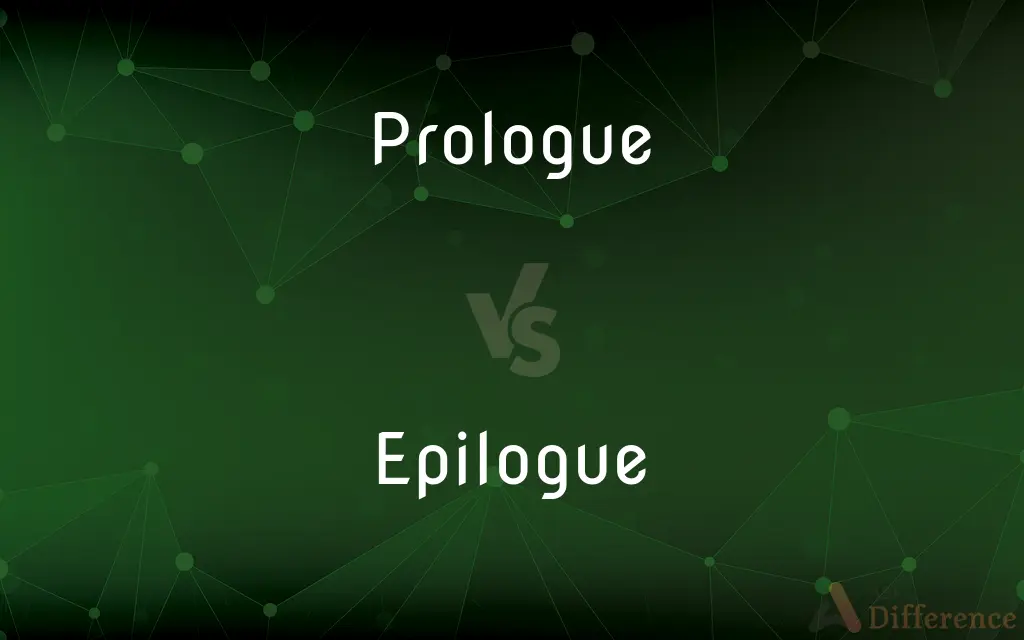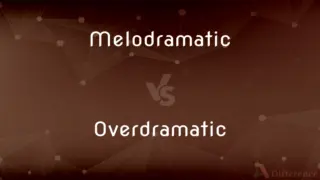Prologue vs. Epilogue — What's the Difference?
By Tayyaba Rehman & Maham Liaqat — Updated on March 15, 2024
"Prologue" introduces a story, setting the stage or background, often before the main action. "Epilogue" concludes a narrative, providing closure or insights after the main events.

Difference Between Prologue and Epilogue
Table of Contents
ADVERTISEMENT
Key Differences
Prologue serves as a preliminary part of a book, play, or movie, intended to introduce the story's setting, background, characters, or themes. It sets the stage for the narrative that follows, offering readers or viewers context that may enhance their understanding or engagement with the main story. Prologues can vary in form, ranging from a direct address by the author to a scene that precedes the main action, establishing the tone or setting the narrative framework. Epilogue, on the other hand, is a section that comes after the conclusion of the main narrative, offering additional information, resolution, or a glimpse into the characters' futures. It serves to provide closure, answer unresolved questions, or suggest the long-term consequences of the story's events. An epilogue can help bridge the gap between the story's end and the reader's departure from the narrative world, leaving them with a sense of completeness or a final thought to ponder.
While both a prologue and an epilogue are distinct from the core narrative, they perform complementary roles in framing the story. The prologue prepares the audience for the journey ahead, potentially enriching the narrative with crucial background or thematic elements. In contrast, the epilogue allows for reflection, offering a chance to tie up loose ends or extend the narrative beyond its climax, providing a broader perspective on the story's implications.
The decision to include a prologue or epilogue depends on the story's needs and the author's intentions. A prologue might be used to create intrigue, introduce a vital piece of history, or establish a narrative voice. An epilogue might be chosen to conclude character arcs satisfyingly, hint at future stories in a series, or leave the audience with a lingering message or mood.
In terms of structure, prologues are often narrative or descriptive, setting the scene or offering insights that inform the subsequent plot. Epilogues, however, might be reflective, looking back on the events of the story, or forward-looking, projecting into the characters' futures. This structural difference underscores the forward-moving action of the prologue and the reflective, sometimes speculative nature of the epilogue.
Comparison Chart
Purpose
Introduces the story, providing background or context.
Concludes the story, offering closure or future insights.
ADVERTISEMENT
Position
Precedes the main narrative.
Follows the main narrative's conclusion.
Function
Sets the stage, establishes tone, or introduces themes.
Provides resolution, reflects on the narrative, or hints at future events.
Common Forms
Direct author address, background scene, thematic introduction.
Reflective commentary, future projections, resolution of loose ends.
Impact
Prepares readers for the story, enhancing engagement.
Leaves readers with closure, satisfaction, or contemplation.
Compare with Definitions
Prologue
Can be written from a different point of view than the main story.
The prologue was narrated by a character who later remains mysterious.
Epilogue
Often reflects on the story's thematic messages or moral.
The epilogue pondered the enduring impact of the characters’ choices.
Prologue
Sets the tone or atmosphere of the book.
The eerie prologue set a suspenseful tone for the mystery novel.
Epilogue
Provides a glimpse into the characters' futures after the main events.
The epilogue showed the protagonists' lives years later.
Prologue
Often contains backstory or events that precede the main plot.
In the prologue, the hero’s childhood tragedy was detailed.
Epilogue
May set up a sequel or a continuation of the story.
The epilogue hinted at new challenges awaiting the heroes.
Prologue
Acts as a narrative gateway, setting the scene for the story.
The prologue introduced a historical event crucial to the story’s conflict.
Epilogue
Offers emotional closure to the reader.
The touching epilogue provided a satisfying conclusion to the love story.
Prologue
Sometimes addresses the reader directly, providing guidance.
The author used the prologue to explain the novel’s inspiration.
Epilogue
Can resolve secondary storylines or unanswered questions.
In the epilogue, the fate of the supporting characters was revealed.
Prologue
A prologue or prolog (from Greek πρόλογος prólogos, from πρό pró, "before" and λόγος lógos, "word") is an opening to a story that establishes the context and gives background details, often some earlier story that ties into the main one, and other miscellaneous information. The Ancient Greek prólogos included the modern meaning of prologue, but was of wider significance, more like the meaning of preface.
Epilogue
An epilogue or epilog (from Greek ἐπίλογος epílogos, "conclusion" from ἐπί epi, "in addition" and λόγος logos, "word") is a piece of writing at the end of a work of literature, usually used to bring closure to the work. It is presented from the perspective of within the story.
Prologue
An introduction or preface, especially a poem recited to introduce a play.
Epilogue
A short poem or speech spoken directly to the audience following the conclusion of a play.
Prologue
An introduction or introductory chapter, as to a novel.
Epilogue
The performer who delivers such a short poem or speech.
Prologue
An introductory act, event, or period.
Epilogue
A short addition or concluding section at the end of a literary work, often dealing with the future of its characters. Also called afterword.
Prologue
A speech or section used as an introduction, especially to a play or novel.
Epilogue
An event which reflects meaningfully on a recently ended conflict or struggle.
Prologue
One who delivers a prologue.
Epilogue
A short speech, spoken directly at the audience at the end of a play
Prologue
(computing) A component of a computer program that prepares the computer to execute a routine.
Epilogue
The performer who gives this speech
Prologue
(cycling) An individual time trial before a stage race, used to determine which rider wears the leader's jersey on the first stage.
Epilogue
A brief oration or script at the end of a literary piece; an afterword
Prologue
To introduce with a formal preface, or prologue.
Epilogue
(computing) A component of a computer program that prepares the computer to return from a routine.
Prologue
The preface or introduction to a discourse, poem, or performance; as, the prologue of Chaucer's "Canterbury Tales;" esp., a discourse or poem spoken before a dramatic performance
Epilogue
(transitive) To conclude with an epilogue.
Prologue
One who delivers a prologue.
Epilogue
A speech or short poem addressed to the spectators and recited by one of the actors, after the conclusion of the play.
A good play no epilogue, yet . . . good plays prove the better by the help of good epilogues.
Prologue
To introduce with a formal preface, or prologue.
Epilogue
The closing part of a discourse, in which the principal matters are recapitulated; a conclusion.
Prologue
An introduction to a play
Epilogue
A short speech (often in verse) addressed directly to the audience by an actor at the end of a play
Epilogue
A short passage added at the end of a literary work;
The epilogue told what eventually happened to the main characters
Common Curiosities
Are prologues and epilogues always separate from the main chapters?
Typically, yes, they are considered separate entities that frame the main story, not counted as chapters.
How long should a prologue or epilogue be?
There’s no set length; it should be as long as necessary to serve its purpose without overwhelming the reader with information or prolonging the story unnecessarily.
Can a story have both a prologue and an epilogue?
Yes, a story can have both, each serving its distinct purpose before and after the main narrative.
Can a prologue contain information not found in the main story?
Yes, prologues often include critical backstory or details that are not covered in the main narrative but are important for understanding it.
Is it common for all genres to use prologues and epilogues?
Their use varies by genre, with some (like fantasy or historical fiction) more likely to use them due to complex world-building or extensive character arcs.
Should a first-time author include a prologue or epilogue?
It depends on the story. New authors should consider whether these elements enhance the narrative or if the same effect can be achieved within the chapters.
Is a prologue or epilogue necessary in a novel?
Neither is strictly necessary; their inclusion depends on the story’s needs and the author's preference for framing the narrative.
Do prologues and epilogues have a specific format?
There’s no strict format, but they typically are written in the same style as the main narrative, though they can differ in perspective or tone.
Can an epilogue be used to set up a sequel?
Yes, an epilogue can hint at future events or unresolved issues that might be explored in a sequel.
How do readers typically react to prologues and epilogues?
Reactions vary; some readers appreciate the additional context or closure they provide, while others might skip them, preferring to dive straight into the main story or feeling satisfied with the main ending.
Share Your Discovery

Previous Comparison
Melodramatic vs. Overdramatic
Next Comparison
Rifle vs. CarbineAuthor Spotlight
Written by
Tayyaba RehmanTayyaba Rehman is a distinguished writer, currently serving as a primary contributor to askdifference.com. As a researcher in semantics and etymology, Tayyaba's passion for the complexity of languages and their distinctions has found a perfect home on the platform. Tayyaba delves into the intricacies of language, distinguishing between commonly confused words and phrases, thereby providing clarity for readers worldwide.
Co-written by
Maham Liaqat











































